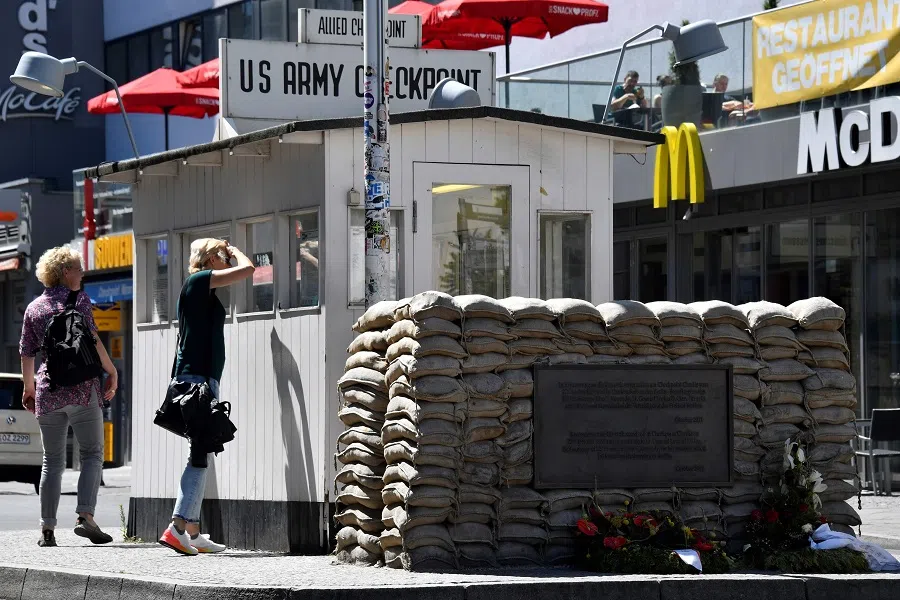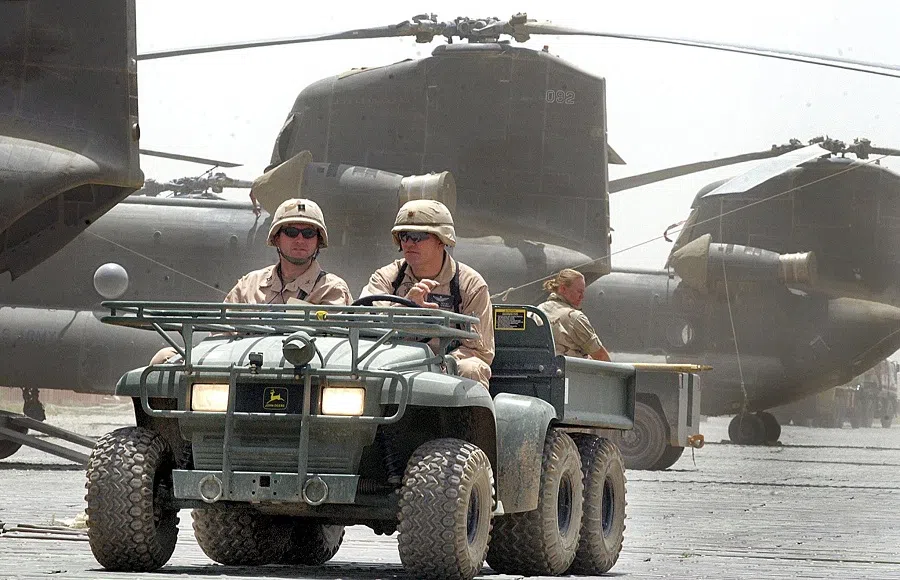No country can be the world's policeman: Debt-ridden US needs to focus on itself
For all of President Trump's failings, says US academic Han Dongping, he did persist in his belief that the US has over-extended itself abroad and sought ways to pull it back. Whoever becomes the US president next will have to recognise that the US's global role has changed irrevocably since 1945.

At the end of WWII in 1945, the US was an undisputed victor and admittedly at its peak. It was the only major power that managed to escape the horrible aftermath of the war. It possessed 75% of the world's gold and its GNP accounted for 50% of the world's GNP. It was a founding member of the United Nations, a permanent member of the United Nations Security Council, and the world's largest creditor nation then. The International Monetary Fund, General Agreement on Tariffs and Trade, World Bank, and other international organisations were also initiated and controlled by it.
While Britain, France, and the Soviet Union were victors too, they had to endure the devastating impacts of war. As for the countries that lost the war - Germany, Japan, Italy - not only were they war-battered, their lands were also occupied by the US and the Soviet Union. They also had to unconditionally accept the terms imposed on them by the victorious countries. From its perch above the rest, the US enjoyed a bird's eye view of the world back in the day. The US's current global strategic framework was also established under such a background.
However, during the Cold War period, the US supported the Chiang Kai-Shek government in China's civil war. After Chiang Kai-shek was defeated, it got embroiled in the Korean War, hoping to win the war it had lost in China. In today's currency, the US spent US$389.8 billion on the war but got nothing substantial in return. Soon after, it landed itself in the Vietnam War that lasted 17 years and nine months. In the end, it was defeated terribly and incurred heavy casualties.
To some extent, this (Vietnam War) shook the US's foundations and is also the reason why Richard Nixon was forced to seek a rapprochement with China in 1972.

With the exception of the atomic bomb, the US had used all other forms of advanced weaponry during the Vietnam War. It dropped more bombs in Vietnam than the total amount of bombs dropped over Europe and Asia during WWII. This resulted in over two million deaths and injuries in Vietnam, and an unprecedented amount of environmental damage. The US spent US$843.6 billion on the Vietnam War and is still paying the medical bills of a huge number of wounded soldiers today. In addition, it is also paying the price of anti-war movements back home, especially those initiated by American soldiers. To some extent, this shook the US's foundations and is also the reason why Richard Nixon was forced to seek a rapprochement with China in 1972.
The US's missteps
The Cold War ended in 1991 with the dissolution of the Soviet Union. As the Cold War had hurt both warring parties of the US and the Soviet Union, the US should have taken the opportunity to rest and recuperate. But the George H. W. Bush (Bush Senior) administration considered itself the winner and proposed a New World Order to reshape world power through its super military power. When Bush Senior lost his bid for re-election, his New World Order strategy was shelved.
When Donald Trump became US president, the government was already running a deficit of US$20 trillion.

In 2000, Bush Senior's son, George W. Bush (Bush Junior) became US president and immediately brought up his father's New World Order strategy again. He made use of the 9/11 attacks to invade Afghanistan, and also invaded Iraq in 2003 on the grounds that Saddam Hussein possessed weapons of mass destruction. The Afghanistan war has been ongoing for 19 years with no sign of peace. Apart from incurring heavy casualties, the US has already spent US$910.4 billion on the war. The Iraq war lasted seven years and cost the US a huge amount of casualties and US$1.0001 trillion. (NB: A 2020 article by Neta C. Crawford, professor and chair of political science at Boston University, estimated the figure at nearly US$2 trillion, if one considers "not only funding appropriated to the Pentagon explicitly for the war, but spending on Iraq by the State Department, the care of Iraq War veterans and interest on debt incurred to fund 16 years of US military involvement in the country.")
These wars, along with high regular military and social welfare spending, have resulted in the US running a nearly US$1 trillion deficit every year since the 2000s. When Donald Trump became US president, the government was already running a deficit of US$20 trillion. Former US President Barack Obama had wanted to adjust the US's global strategy and reduce its military presence in Asia in particular. But out of security concerns, some leaders of East and Southeast Asian countries asked the US to stay, which resulted in Obama's "rebalance" to Asia and the Pacific.
His (Donald Trump) campaign strategy won over the hearts of those who did not think that they would ever vote for a Republican.

In 2016, part of the reason why Trump was able to defeat the experienced Hillary Clinton in the presidential elections was because of his awareness that the US's global strategy was unsustainable. During his campaigns, he reiterated the fact that the US should stop interfering with foreign affairs and other countries' politics, and instead put America's national interests first. His campaign strategy won over the hearts of those who did not think that they would ever vote for a Republican.
Trump knew enough to withdraw
No matter how you look at it, Trump has not been a great US president throughout his days in office. In particular, his mishandling of the Covid-19 pandemic has shown the world what the saying "You only find out who is swimming naked when the tide goes out" means. The US's performance in pandemic containment is mismatched with its position as a superpower. Moreover, it has the most number of Covid-19 deaths and infections worldwide. The raging pandemic has also brought forth unprecedented economic damages to the country, putting it in a recession of unprecedented scale. To save the economy and help the unemployed, the US government has already thrown in nearly US$7 trillion, increasing its debt to nearly US$30 trillion. Even if the pandemic subsides quickly, the US economy will not recover in the short term.
His trade wars with China and many other countries were out of an accurate analysis of America's plight.

But Trump did try to reduce US interference in foreign affairs when he was in office. He did not start a new war, and is trying hard to end the war in Afghanistan. Neither did the ongoing wars and conflicts in Syria, Iraq, and Iran escalate. His trade wars with China and many other countries were out of an accurate analysis of America's plight. The US must not allow its trade deficit to continue going up - it would be suicidal if this carries on.
No matter who becomes the next US president, the US will be forced to adjust its global strategy. The time for a world's policeman strategy is long over - the US no longer has the capability to cope with the enormous burden of this strategy. America's way out is in quickly withdrawing overseas troops and drastically cutting down its spending on the military, welfare, police and prisons, so that the US economy can balance its cash flow again.


![[Big read] When the Arctic opens, what happens to Singapore?](https://cassette.sphdigital.com.sg/image/thinkchina/da65edebca34645c711c55e83e9877109b3c53847ebb1305573974651df1d13a)


![[Video] George Yeo: America’s deep pain — and why China won’t colonise](https://cassette.sphdigital.com.sg/image/thinkchina/15083e45d96c12390bdea6af2daf19fd9fcd875aa44a0f92796f34e3dad561cc)